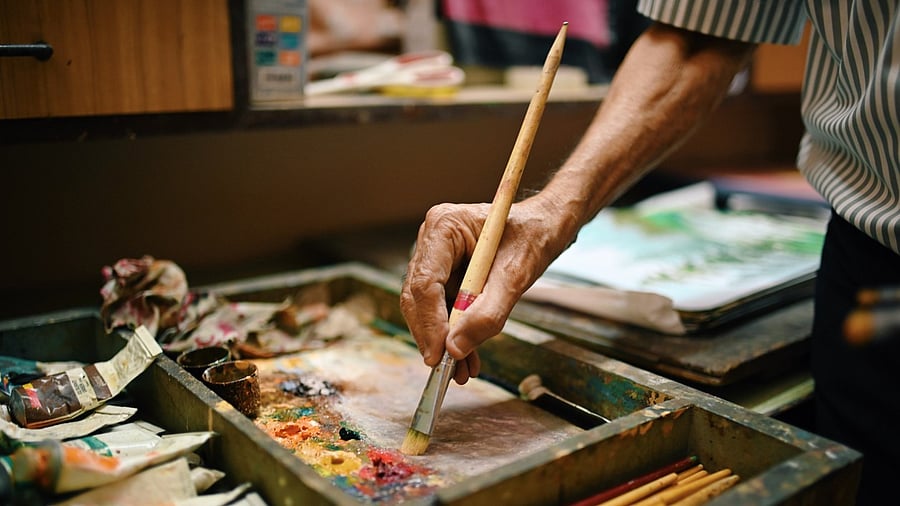
This cop scouts for characters to immortalise them in his photographic art
Credit: iStock photo
Bengaluru: As a boy growing up in a small village in Ramanagara, about 50 km from Bengaluru, B S Shivaraju said all he wanted was to become a policeman. When the 10th pass out made it to the Karnataka Police ranks as a constable, he was predictably thrilled.
But fate had other plans for him. The hard-won dream became just a stepping stone and the moniker 'Cop Shiva' a perfect pseudonym, as he chased after a new dream: to become an artist.
"I was posted in Bengaluru and like a magnet was drawn to 1 Shanthi Road, an art space like no other, which really opened my eyes to an entirely new world," said Shivaraju to PTI.
A space that was found to nurture creativity and cutting-edge art by artist Suresh Jayaram, a legend in the artist circle of the city, naturally took note of the policeman, who, as Jayaram once introduced him in his art column for a newspaper, "carries his village in his backpack as he scouts the city for characters and events that fascinate him".
Perhaps, because he himself was a migrant to a big city, clutching on to his "cultural identity", not willing to let go of it in the swirl of cosmopolitanism, Shivaraju was able to spot subjects in similar predicament. The drama of the dual lives of these migrants became the perfect fodder for Shivaraju's art.
When he came face to face with two such subjects--one who dressed everyday as Tamil film legend MG Ramachandran and another as Gandhi, each had his own compelling reason for pursuing an idiosyncratic routine--he began his photographic art career with a bang.
The success of 'I Love MGR' and 'Being Gandhi' '--the shows made it to some of the prestigious spaces for art in India, like Kochi Biennale and Serendipity Arts Festival -- was enough for Shivaraju to continue his documentation.
Jayaram writes in his column that by choosing subjects like 'Karaga Jatre', originated as 'Karagattam' to celebrate Mariamman in the villages of Tamil Nadu, Shivaraju documents the "ability of humans to transform themselves to become the other".
'Karaga Jatre', for instance, has merged with the very identity of Bengaluru, too, propped up by the villagers of Tamil Nadu who were one of the early migrants to the city.
Around the time his documentation of 'Karaga Jatre' was doing its rounds in the art circuit, Shivaraju said he decided to opt for voluntary retirement from the police force.
"It was becoming increasingly difficult to squeeze in my artistic pursuits, considering being a cop is equally demanding," added Shivaraju.
His mother, who single handedly brought him and his sisters up, by doing chores for daily wages in fields, was apprehensive when he decided to quit his job, he said.
"But she stood by me nevertheless and we are all happier now for the choices we made. I bought her a house in Ramanagara with a garden. More importantly, I get to sleep solid eight hours every day. This was impossible when I was a cop--I was so sleep deprived then," said Shivaraju.
Professionally, Shivaraju said he achieved his zenith when he won the Harvard University's Lakshmi Mittal and Family South Asia Institute Fellow in 2023.
"I never imagined that I, a 10th pass out, could one day attend Harvard," said Shivaraju.
That his mother is the centre of his world is evident in the latest series of his work, 'No Longer a Memory', which will be taken to Seattle Art Fair, to be held on July 17-20, by Bengaluru-based Gallery Sumukha. Shivaraju is one of the five artists being featured there by the gallery.
His mother, 69-year-old Gowramma, is his partner in crime, and the duo pose as various characters in a studio-photo themed series done in Pop Art style.
With bales of floral-patterned colourful bedsheets, the kind that is used in the rural areas of India, as backdrop, the mother and son recreate scenes that they had come across in their lives--some notional and some literal.
The idea popped up for him as he realised that he does not have a single picture with his mother. Growing up, recalled Shivaraju, life was all about surviving every day.
"Going to a studio to take a family portrait was a luxury that we could not afford then," said Shivaraju.
What began as nostalgia, soon snowballed into a project that pops open the world of rural India to the viewers. From mogra-clad bridal couples, typical in Muslim weddings of Ramanagara, to props straight out of village theatrical productions, every picture has a story to tell, said Shivaraju.
It is apparent that the mother and the son were having a lot of fun putting them together.
"My mother's father was a theatre actor. So, playacting is in my mother's blood. She always played along with me, even when I was little, when I used to come home all charged up after watching plays that my grandfather used to take me to," said Shivaraju.
But 'No Longer a Memory', which was showcased as a solo show at Gallery Sumukha recently, is as much a social commentary as it is a tool for family bonding.
"I wanted to show the world how we lived in Ramanagara. Like everywhere else in India, the secular fabric that bound us all together is fraying here, too. So, in a way, this is a documentation of how things were, and what we are losing in our hurry to become something else," said Shivaraju.